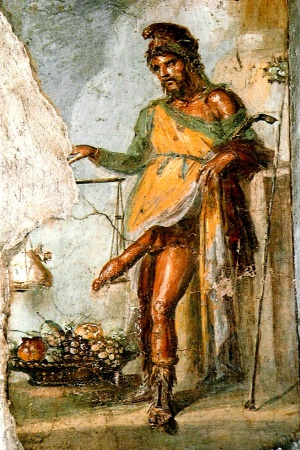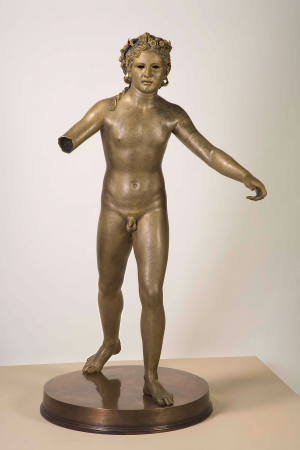(Boylove Documentary Sourcebook) - "To Priapus" by Tibullus, c. 26 BC (full-text poem)

From Elegies (Elegiae, c. 26–19 BC), Book 1, by Tibullus, in Catullus. Tibullus. Pervigilium Veneris, translated by F. W. Cornish, J. P. Postgate and J. W. Mackail, Second Edition, revised by G. P. Goold, Loeb Classical Library (London: William Heinemann; Cambridge, Massachusetts: Harvard University Press, 1988). Footnotes omitted.
“Priapus, tell me—so may the sheltering shade be thine, nor thy head be harmed by sun or snows—what cunning of thine captures the handsome lads? Sure thou hast no glossy beard nor well-kept hair. Naked thou art all through the cold of stormy winter, naked through the parching season of the Dog-star’s heats.”
7Thus I; and thus to me replied the country child of Bacchus, the god armed with the curving billhook:
9“O beware of trusting thyself to the gentle band of boys; for they furnish always some valid ground for love. One pleases, for he keeps a tight hand on his horse’s rein; another drives the calm water before a breast of snow. This one has taken you with his brave assurance, that one by the maiden shame that guards his young cheeks.
15“Perchance at first he will refuse thee; but let not this dishearten thee. Little by little his neck will pass beneath the yoke. Length of time has taught lions to submit to man; with length of time weak water has eaten through rock. The year’s flight ripens the grapes on the sunny hillside; the year’s flight carries the radiant signs along their unvarying round.
21“Be not afraid to swear. Null and void are the perjuries of love; the winds bear them ineffective over land and the face of the sea. Great thanks to Jove! The Sire himself has decreed no oath should stand that love has taken in the folly of desire. Dictynna lets thee without harm assever by her arrows, Minerva by her hair.
27“But if thou art slow, thou wilt be lost. How soon youth passes by! Time stands not idle, nor returns. How quickly does the earth lose its purple hues! how quickly the tall poplar its beauteous leaves! How neglected is the horse, when the lot of weak age overtakes him, that once shot free from the barriers of Elis! I have seen a young man on whom later years were closing round mourning for his folly in the day that had fled. Cruel gods! The snake sheds his years, and is young: but the Fates grant no respite to beauty. Only Bacchus and Phoebus have youth everlasting; of either god are unshorn tresses the glory.
39“Do thou yield to thy lad in aught that he is minded to attempt: love wins most by compliance. Nor refuse to go with him, though far be his purposed journey and the Dog-star bake the land with parching drought, though, threatening the coming storm, the rain-charged bow fringes the sky with hues of purple. Should he wish to fly over the blue waves in a boat, take the oar thyself and drive the light bark through the sea. Nor grieve to undergo rough labour or if thy hands are chafed by tasks to which they are strange. If round the deep glen he would place the ambush, then, so thou canst pleasure him, let thy shoulders not refuse to bear the hunting nets. If he would fence, thou wilt try thy light hand at the sport, and often leave thy side unguarded, that he may win.
53“Then will he be gentle with thee; then thou mayst snatch the precious kiss: he will struggle, but let thee snatch it. He will let thee snatch at first; but later will he bring it for the asking, and presently even he will be fain to hang upon thy neck.
57“But now, alas! our perverse age plies wretched crafts. Now gentle lads have learned to look for gifts. Whoever thou art that first didst teach the sale of love, may an unhollowed stone weigh heavy on thy bones.
61“Love the Pierid maidens, lads, and gifted poets; to no golden presents let the Pierian maids succumb. Verse keeps the lock of Nisus purple. Were verses not, no ivory would have shone on Pelops’ shoulder. He whom the Muses tell of shall live, while earth bears oaks, sky stars, and rivers water. But he who has no ear for the Muses, who sells his love—let him follow the car of Ops of Ida and traverse, a vagabond, three hundred towns and slash the parts he slights to Phrygian measures. Venus allows love’s blandishments their play. She sides with piteous weeping and with suppliant complaints.”
73These things did the god’s voice utter for me to sing to Titius; but them doth Titius’ wife forbid him to remember. So let him listen to his dear; but do ye throng to my school whom some crafty lad with many wiles treats ill. Each of us has his proper glory. Let slighted lovers seek advice from me; to all my doors are open. A time shall come when round the master of the lore of Venus shall crowd the attentive young and take the old man home.
81Alas! what lingering torture is this love for Marathus: helpless is my skill, and helpless all my cunning. Spare me, I pray thee, boy, lest I become a byword, when folk shall laugh at my useless teaching.

See also
- Adult friend (dictionary)
- Age of attraction (dictionary)
- Boylove
- Catamite
- Ephebophilia
- Historical boylove relationships in ancient Rome
- Loved boy (dictionary)
- Minor-attracted person (dictionary)
- Pederasty
- Pedophilia
- Young friend (dictionary)